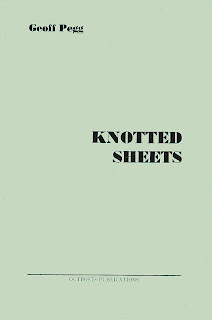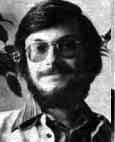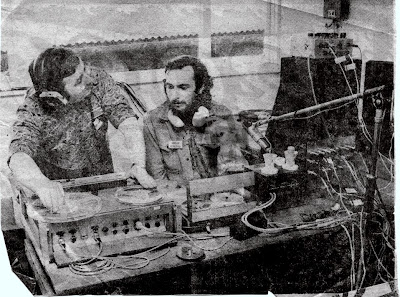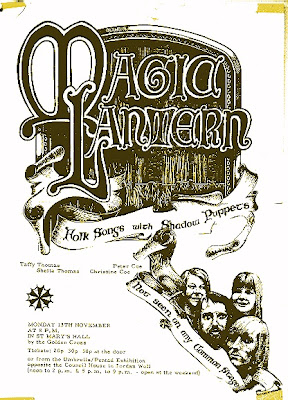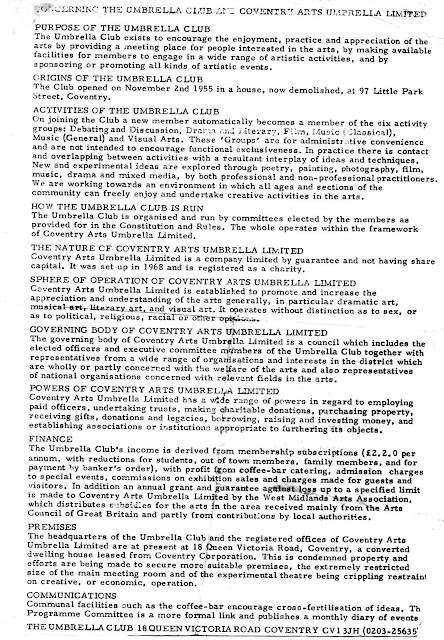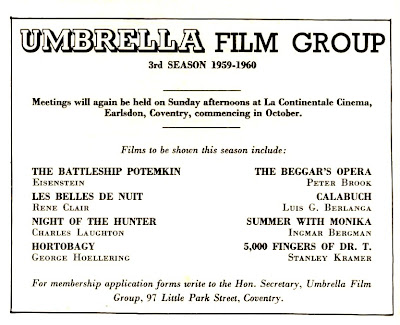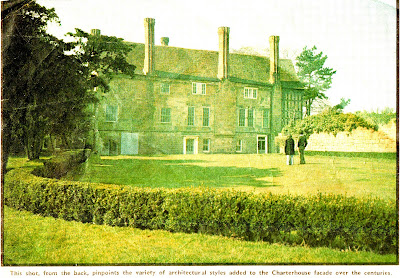According to Martyn Richards the Umbrella once boasted over a thousand poets…
In the late 50’s and early 60’s the Umbrella was known for it’s quality literary journal UMBRELLA to which Philip Larkin had contributed an article (as you may have seen already on another post on here).
POETS ON TOUR
The Umbrella’s Poets on Tour programme brought to the Umbrella club poets and writers such as Pete Morgan and Steve Morris (in conjunction with the Birmingham Poetry Festival), Brian Patten, Julian Mitchell, Antonio Byatt, Hugo Williams, Vernon Scannell, Dave Ward (Liverpool Poet).
POETRY COURSES
In terms of lectures and workshops there were Extra Mural courses provided by Birmingham University.
THE UMBRELLA POETS
C 1971, the Umbrella Poets met in the upstairs room at Queen Victoria Road and a monthly basis. It’s likely that the group had been going quite a while but my main interest was music at the time and writing song lyrics. Al Docker (who also organised the band nights) wrote lyrics too and joined in one of the sessions. We were about 19 at the time and the group was mostly quite a bit older than us and on his suggestion I went to a group session the following month. We both received a warm welcome and found encouragement. I had recently branched into poetry from writing song lyrics and shyly tried out a couple of poems. It was really the first time I’d read in public (albeit a small group session) but it was the beginning of something for me.
 |
| John Hewitt |
I can’t remember all the names but John Hewitt seemed to be leading the group. John was the most Seamus Heaney, Derek Mahon and Michael Longley. Between 1957 and 1972 (when he retired) he was Director of the Herbert Art Gallery & Museum and involved with the Umbrella club. I didn’t realise at the time what distinguished company I was in at the time. Other members were Terry Watson (an English teacher at King Henry V111 Grammar School and a mainstay of the Umbrella club), Geoff Pegg (Poet, musician and broadcaster) whose chapbook Knotted Sheets had just been published by Outposts. Norman Wheatley and John Leopold (both singer songwriters and poets) and some of the others mentioned in the Knotted Sheets post on here.
significant Irish poet to emerge before the 1960s generation of poets that included.
AN IRISHMAN IN COVENTRY 1958
A full year since, I took this eager city,
the tolerance that laced its blatant roar,
its famous steeples and its web of girders,
as image of the state hope argued for,
and scarcely flung a bitter thought behind me
on all that flaws the glory and the grace
which ribbons through the sick, guilt-clotted legend
of my creed-haunted, godforsaken race.
My rhetoric swung round from steel’s high promise
to the precision of the well-gauged tool,
tracing the logic in the vast glass headlands,
the clockwork horse, the comprehensive school.
Then, sudden, by occasion’s chance concerted,
in enclave of my nation, but apart,
the jigging dances and the lilting fiddle
stirred the old rage and pity in my heart.
The faces and the voices blurring round me,
the strong hands long familiar with the spade,
the whiskey-tinctured breath, the pious buttons,
called up a people endlessly betrayed
by our own weakness, by the wrongs we suffered
in that long twilight over bog and glen,
by force, by famine and by glittering fables
which gave us martyrs when we needed men,
by faith which had no charity to offer,
by poisoned memory, and by ready wit,
with poverty corroded into malice,
to hit and run and howl when it is hit.
This is our fate: eight hundred years’ disaster,
crazily tangled as the Book of Kells;
the dream’s distortion and the land’s division,
the midnight raiders and the prison cells.
Yet like Lir’s children, banished to the waters,
our hearts still listen for the landward bells.
Poetry and Folk Sessions
These were popular at the Umbrella and took various forms over the years.
Early sessions was organised c 1970 by Geoff Pegg and Norman Wheatley and also singer songwriter John Brown who formed the folk duo Toadstool. Some of the blurbs read –
“Poetry and Folk – A session for poets and folk singers, where new ideas may be read or sang, and discussion is encouraged. Not for performers only – you can listen if you do not wish to take part.”
“A folk based session featuring a guest folk group from Coventry called Toadstool, whose members include John Brown, who is no stranger to the Umbrella club. there will other singers, musicians and poets present at what should be a very enjoyable evening of poetry and folk. Look out next month for an event featuring a well-known poet.(Could it be Roger McGough?). (April 71 – Umbrella Programme).

